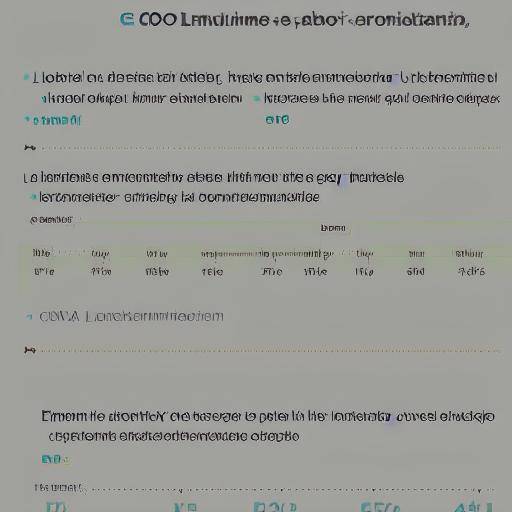
Emotional energy is a vital resource that influences our mental and emotional well-being. The ability to set healthy limits is essential to protect and conserve this energy. In this article, we will explore the importance of setting limits to protect your emotional energy and promote integral well-being. From the meaning of emotional energy to practical advice to manage healthy boundaries, we will offer a comprehensive analysis that will allow you to better understand this vital aspect of emotional health.
Introduction
Emotional energy is a limited and valuable resource that directly affects our mental health and general well-being. Establishing healthy boundaries is essential to protect this energy and maintain an emotional balance. This article invites readers to explore how to set these limits can improve their quality of life and emotional well-being.
History and Background
Understanding emotional energy and the importance of establishing healthy boundaries has its roots in various psychological traditions and currents throughout history.
Evolution of concepts of emotional energy and limits
- Classical psychology: Sigmund Freud and Carl Jung discussed the importance of psychic energy and the need to handle it properly.
- Humanist psychology: Abraham Maslow and Carl Rogers highlighted the importance of self-care and authenticity for emotional well-being.
- Modern Psychology: Positive psychology and cognitive-behavioral therapy have promoted the importance of establishing limits to maintain mental health.
Analysis in Deep
Benefits of maintaining healthy limits
- Stress reduction: Setting clear limits can help reduce stress by avoiding emotional overload.
- Improving RelationsHealthy limits encourage mutual respect and effective communication.
- Increase in Self-esteem: Protecting your emotional energy reinforces self-worth and sense of control over life.
Challenges in managing emotional energy
- Guilt and Anxiety: Often setting limits can generate feelings of guilt or anxiety, especially in close relationships.
- External resistance: People around them can resist their limits, creating conflict and tension.
- Consistency: Maintaining consistent limits can be difficult, especially when facing external pressures.
Specific examples and case studies
- Case of a Health Professional: A doctor who learns to say "no" at unnecessary extra hours to maintain his mental health and well-being.
- Example of a Working Mother: A mother who sets clear limits between working time and family time to ensure that both receive adequate care.
Comprehensive review
Implementation in practical situations
- Labour Environment: Implementing digital disconnecting policies outside working hours to protect the emotional energy of employees.
- Family Life: Establish clear limits on personal time and family responsibilities to ensure a healthy balance.
Comparative analysis
Comparison between emotional energy, healthy limits and emotional well-being
- Emotional Energy: It is the resource that influences our mental and emotional state.
- Healthy Limits: These are the barriers we set to protect our emotional energy.
- Emotional Welfare: It is the result of effectively managing our emotional energy and setting healthy limits.
Examples Concrete
- Comparison between a person with established limits and another without limits: The first shows higher levels of emotional well-being, less stress and healthier relationships compared to the second, which experiences depletion and frequent conflicts.
Practical Tips and Accessible Tips
- Establish clear limits: Define specific schedules for personal and professional activities and respect them.
- Learn to say "no": Do not commit to more than you can handle realistically.
- Assertive Communication: Express needs and limits clearly and respectfully.
- Regular self-assessment: Reflect periodically on your limits and adjust them as necessary.
- Practice Self-care: Dedicate time for activities that recharge your emotional energy, such as exercise, meditation and proper rest.
Perspectives of Industry and Expert Reviews
Opinions of Experts on Psychology
- Brené Brown: Stresses the importance of vulnerability and the establishment of limits as essential components of emotional well-being.
- Henry Cloud and John Townsend: In their book "Boundaries", they emphasize how healthy boundaries are fundamental to living a balanced and satisfying life.
Perspectives in the Labour Area
- Technological Companies: Implement digital disconnecting policies to protect the emotional energy of their employees, improving productivity and reducing exhaustion.
Case Studies and Real Life Applications
Examples of success in managing healthy limits
- Case of a Business Executive: An executive that implements strict limits to balance your time between work and family, improving your mental health and work performance.
- Example of an Education Community: A school that promotes healthy limits between working time and personal time to improve the well-being of teachers and the academic performance of students.
Future Trends and Predictions
New trends
- Time Management Technology: Tools and applications that help people establish and maintain healthy limits.
- Organizational culture: Increased emphasis on the emotional well-being of employees and the implementation of equilibrium policies between work and personal life.
Predictions
- Greater Mental Health Awareness: The importance of establishing healthy limits to protect emotional energy is expected to continue to gain recognition and acceptance in society and organizations.
Conclusions and FAQs
Conclusions
Establishing healthy boundaries is crucial to protecting emotional energy and maintaining comprehensive well-being. Through effective strategies and the application of best practices, it is possible to achieve a balance that benefits both mental health and personal and professional relationships.
Frequently asked questions
1. Why is it important to set limits?
Setting limits is important to protect your emotional energy, reduce stress and improve your overall relationships and well-being.
2. How can I start setting healthy boundaries?
Start by identifying areas in your life where you feel overloaded and set clear and communicative limits to better manage your time and energy.
3. What to do if someone doesn't respect my limits?
Be firm and clear in communicating your limits, and be willing to strengthen them if necessary. It is important to remain consistent so that others understand and respect their needs.
4. How can I balance my personal and professional life?
Plan your time carefully, set priorities and do not hesitate to delegate tasks whenever possible. Be sure to devote time to activities that recharge your emotional energy.
This comprehensive approach provides a deep understanding of the importance of healthy boundaries to protect emotional energy, offering practical strategies and real examples that will help readers implement positive changes in their lives.






















































